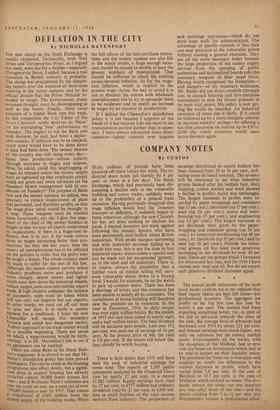DEFLATION IN THE CITY
By NICHOLAS DAVENPORT
Tt•IE new slump on the Stock Exchange is readily explained. Technically, both Wall Street and Throgmorton Street, as I argued last week, were due for a decline—especially Throgmorton Street, I added, because a real recession in British industry is probable. The slump was precipitated by the disturb- ing reports over the weekend of short-time working in the motor industry and by the official denials that the Prime Minister in- tended to resign. The Government, many investors thought, must be disintegrating as well as the boom. Finally, there came rumours of a higher Bank rate this week. In this connection the City Editor of the News Chronicle surely deserves an `Oscar' for his outstanding 'bear' performance on Monday. The neglect to use the Bank rate with decision, he said, had been a deplor- able mistake. If inflation was to be checked, much more would have to be done about it than had been done. The money income of the country was still rising every day— faster than production—almost entirely through increases in wages and salaries. How, he asked, could this leapfrogging of wages be stopped unless the money supply were so tightened up that employers simply could not grant any more advances (as the Standard Motor management told its em- ployees on Tuesday)? The purpose of Bank rate and the money squeeze, he added, was precisely to reduce employment of plant and personnel, and therefore profits, so that the wage-price spiral would be brought to a stop. These weapons must be wielded more ferociously, etc. etc. I give this argu- ment of the chief of the money fanatics at length so that we may all clearly understand its implications. If there is a wage-cost in- flation, that is to say, if the trade unions insist on wages increasing faster than pro- ductivity (as they did last year), then the misery of unemployment has to be inflicted on the guiltless in order that the guilty may be taught a lesson. The whole country must be made to suffer for the sins of the few. Although the nation cannot survive unless industry produces more and produces it More cheaply, dearer money and tighter Credit must slow down the industrial wheels, reduce output, raise costs and ruin the export trade. If high imports endanger the balance Of payments, steps must be taken which Will not only cut imports but cut exports. In other words, we must cut off our nose to spite our face. It is really a money squeeze for a madhouse. I hope the new Chancellor will escape this monetary hYsteria and adopt less dangerous tactics. A direct approach to the trade unions would be a sensible beginning. There are terms on which a wage-restraint would be forth- coming : it is Mr. Macmillan's job to see if an agreement can be reached. There are other flaws in Sir Oscar Hob- son's argument. It is absurd to say that Mr. Butler's disinflation policy has been proved inadequate. The cuts he made in the housing Programme take effect slowly, but a signifi- cant drop in council housing has already occurred—about 30,000 fewer houses last year--and if Professor Paish's estimates are near the truth we may see a total cut of over 150.000 houses a year by 1957. That means a withdrawal of £300 million from the money supply of the building trades. When
the full effects of the hire-purchase restric- tions and the money squeeze are also felt in the motor trades, a large enough reces- sion should be caused to double at least the present numbers of unemployed. That should be sufficient to check the existing excess-demand inflation. As for the wage- cost inflation, which is implicit in the present wage claims, the way to avoid it is not to threaten the unions with wholesale unemployment but to try to persuade them to be moderate and to match an increase in wages by an increase in productivity.
If I defend the Chancellor's disinflation policy it is not because 1 approve of the whole of it but because I do not want to see restrictionism carried farther than is neces- sary. I have always advocated more direct measures—tighter controls over imports
and exchange operations—which do not need huge staffs for administration. The advantage of specific controls is that they can ease pressures at the vulnerable points without causing a general recession. They are all the more necessary today because the large proportion of the money supply derived from the spending of public authorities and nationalised boards robs tbe monetary weapons of their usual force. Having wisely recognised the limitations— and dangers—of his monetary technique. Mr. Butler did use direct controls (through cuts in council housing and hire-purchase restrictions) to ease the labour pressure at its most vital points. His policy is now get- ting the results he intended. An industrial recession of some size is likely. If it could be followed up by a more energetic attempt to increase workers' savings—by offering a tax-free concession on interest up to £50 or £100—the whole economy would soon move forward again.


































 Previous page
Previous page